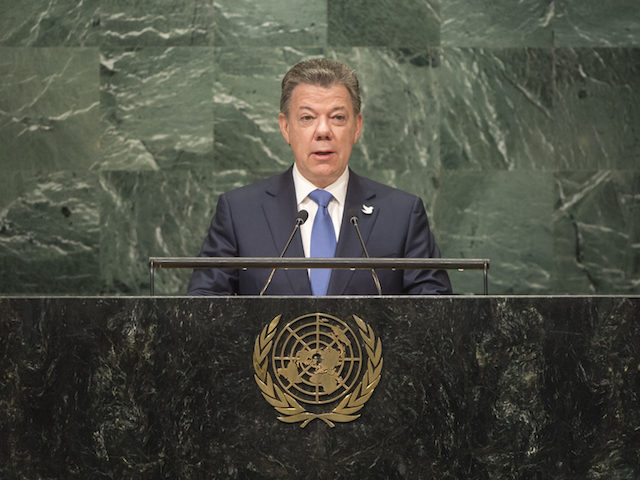
“Ladies and gentlemen, representatives of the nations of the world… I return to the UN today, on the International Day of Peace, to announce, with all the strength of my voice and my heart, that the war in Colombia has ended,” Santos announced, to thunderous applause. Noting that the Revolutionary Armed Forces of Colombia (FARC) are “the biggest and oldest guerrilla on the American continent,” Santos told the assembly that “a bilateral and definitive ceasefire and cessation of hostilities took place” last month and, since then, “there has not been a single death, a single wound, a single shot fired in the conflict with FARC.”
The peace agreement is still not final, as FARC terrorists and government representatives must sign the final document on September 26, and the agreement will not take effect until the Colombian people approve it in a vote on October 2. There is no clear protocol for what happens should Colombians vote “no” on the referendum.
This time last year, Santos had recently returned from Cuba to address the General Assembly. In Cuba, accompanied by dictator Raúl Castro, Santos shook hands with terrorist leader “Timochenko” on a tentative agreement. Timochenko, granted safe haven in Cuba after joint U.S.-Colombian counterterrorism operations forced him to flee the Colombian countryside, has since returned to Colombia and is expected to become the leader of a new FARC political party. The FARC will be eligible to launch congressional candidates in 2018, and its terror leaders have expressed an eagerness to do so.
As the world’s wealthiest non-jihadist terrorist group, the FARC is expected to have plenty of money to bankroll candidates friendly to their Marxist agenda. Opponents of the peace deal have expressed concerns that the FARC will funnel the millions it generates in cocaine trafficking into political campaigns.
Many of those who oppose the peace deal also note that the special FARC tribunals will only send terrorists to prison who are found guilty of “crimes against humanity.” Those found guilty of “political crimes” will be relegated to community service, such as working to remove the thousand of land mines the FARC has planted throughout the Colombian countryside. The government has yet to clarify the difference between the two tiers of crimes, or where crimes like drug trafficking, child rape, forced abortions on raped girls, and abductions for ransom will fall.
Santos did not address these concerns before the UN. Instead, he presented the image of “a Colombia in peace, a Colombia reconciled.” He boasted of the plans to melt down the weapons FARC terrorists are expected to hand over as they are processed by special tribunals and use them to build monuments – “one here, one in Cuba, and one in Colombia.”
Santos noted favorably that the government “will guarantee their [the FARC’s] participation in politics,” which he expects will “strengthen democracy and the electoral system in Colombia.”
Santos also argued that allowing the FARC to operate legally would bring many environmental benefits to Colombia.
The president ended his speech thanking Cuba first among international peers, and thanking states like Norway and Venezuela – which has actively antagonized Colombia and committed international crimes against Colombian nationals – before thanking the United States.
http://www.breitbart.com/national-security/2016/09/21/santos-unga-speech-colombia-farc